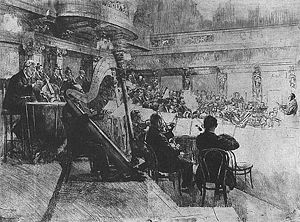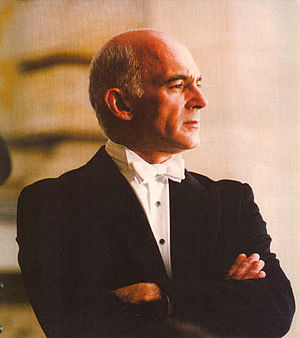Felix Weingartner
Violin Concerto in G Major (1912)
 |
| English: Vienna Philharmonic Orchestra at the rehearsal (Felix von Weingartner conducting) (Photo credit: Wikipedia) |
Rundfunkorchester.
Panting Info - Waterfall City by ~artbytheo on deviantart.
I. Allegro placido - 00:00
II. Andantino quasi allegretto - 13:40
III. Caprice savoyard: Allegro molto deciso - 21:15
Weingartner was born in Zara, Dalmatia, Austria--Hungary (now Zadar, Croatia), to Austrian parents, and the family moved to Graz in 1868. His father died that same year. He studied with Wilhelm Mayer (who used the pseudonym of W. A. Rémy and also taught Ferruccio Busoni) and in 1881 went to Leipzig to study philosophy, but soon devoted himself entirely to music, entering the Conserva
tory in 1883 and also studying under Franz Liszt in Weimar: he was among Liszt's later pupils. Liszt helped produce Weingartner's opera Sakuntala for its world premiere in 1884 with the Weimar orchestra. According to the Liszt biographer Alan Walker, the Weimar orchestra of the 1880s was far from its peak of a few decades earlier—and the opera performance ended with orchestra going one way and chorus another. Walker sources this to Weingartner's autobiography, published in Zürich and Leipzig in 1928-1929. The same year, 1884, he became the director of the Königsberg Opera. From 1885 to 1887 he was Kapellmeister in Danzig, then until 1889 in Hamburg, and until 1891 in Mannheim. From 1891 he was Kapellmeister of the Royal Opera and conductor of symphony concerts in Berlin; he resigned from the Opera, though continuing to conduct the Symphony concerts, and settled in Munich, where he incurred the enmity of Rudolf Louis and Ludwig Thuille.
 |
| Prof. Dr. Alun Francis (Great Britain) (Photo credit: Wikipedia) |
In 1902, at the Festival of Mainz, Weingartner conducted the complete symphonies of Beethoven. From 1908 to 1911 he was the principal conductor of the Vienna Hofoper succeeding Gustav Mahler; he retained the conductorship of the Vienna Philharmonic until 1927. From 1912 he was again Kapellmeister in Hamburg, but resigned in 1914 and went to Darmstadt as general music director. He also frequently conducted for the Boston Opera Company between 1912-1914. In 1919-20 he was conductor of the Vienna Volksoper. In 1920 he was Professor of the Franz Liszt Academy in Budapest. From 1927 to 1934 he was music director of the Sinfonieorchester Basel. He gave his last concert in London in 1940 and died in Winterthur, Switzerland two years later.
Weingartner was early interested in the occult, astrology, and Eastern mysticism, which influenced his personal philosophy and his music to some extent. He was himself a prolific writer who published a poetical drama, Golgotha, in 1908. He wrote copiously on music drama, on conducting, on the symphony since Beethoven, on the symphonies of Beethoven, Schubert and Schumann as well as on art and esoteric subjects. Two collections of essays were Musikalische Walpurgisnacht (1907) and Akkorde (1912). He also published an autobiography, Lebenserinnerungen in 1923.










